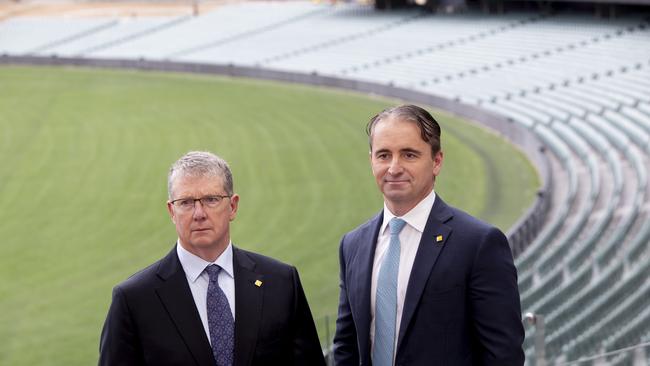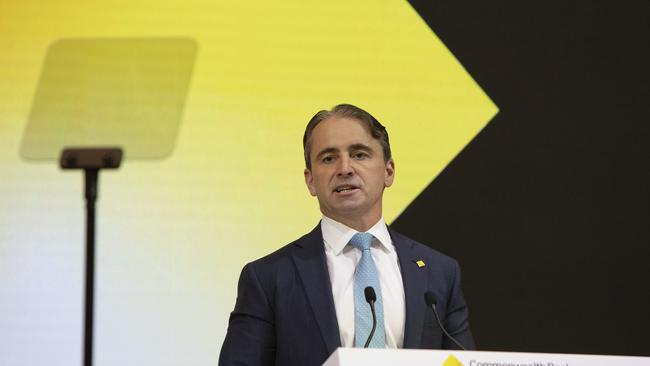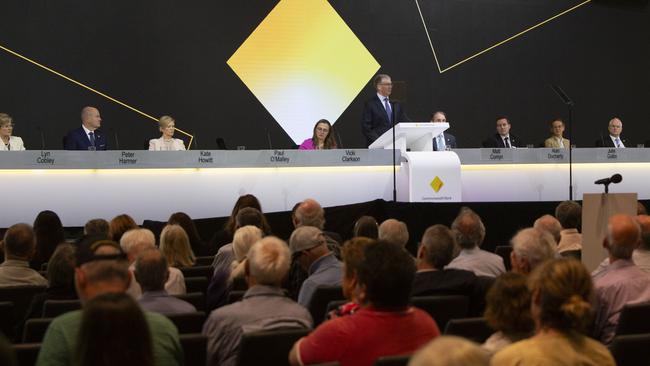Commonwealth Bank defends lending amid warning over the future of 30,000 customers
Shareholders line up in Adelaide to lob questions at the nation’s biggest bank over its lending policies.

Commonwealth Bank has conceded some mining or carbon-exposed communities may not have a future as the banking major defended its lending to energy projects, and warned the country was facing a tough inflation outlook.
Chief executive Matt Comyn says Australia was facing a “higher for longer” inflationary environment, revealing the bank had handed out 132,000 tailored hardship packages in the past year.
He said the Australian economy was “still absorbing the shocks of the past few years”, noting while inflation was falling, it remained persistent.
“Households are continuing to find it very challenging,” Mr Comyn told shareholders at the bank’s annual general meeting in Adelaide on Wednesday.
“However, the domestic economy remains fundamentally sound with several structural advantages that provide optimism for the future.”

Mr Comyn said CBA, which boasts serving almost 17 million customers across its Australian and New Zealand businesses, would continue to serve regional Australia through the bank’s branches, confirming none would be shut “until at least the end of 2026”.
CBA has moved to adapt some branches to serve customers in the morning before transitioning to supporting customers online or over the phone across the afternoon.
“We will remain focused on supporting our customers, investing to protect the community, and providing strength and stability to the broader economy,” Mr Comyn said.
New data shows CBA shut 32 branches last year, taking its national numbers to just 696.
This is down 318 from CBA’s branch numbers five years ago.
But the CBA boss faced questioning over moves to shut its Bankwest branches in Western Australia, as the lender consolidates the brand as an online-only operation.
CBA has pitched the move as a natural consequence of the increasing digital tilt of the bank’s customer base.
But CBA’s move to restrict transactions to crypto platforms, as a response to a rise in scams and frauds flowing from digital transactions, saw the bank cop a grilling from shareholders.
One investor questioned why CBA had slowed or blocked transfers to crypto platforms, including Binance.
Mr Comyn said it was “simply a matter of fact that many people who are scamming Australian residents are using crypto rails to exit the money”.
Mr Comyn said he regretted the rules “at times”, noting they made it inconvenient for some customers, but noted they had significantly curtailed scam losses for customers in the last year.
The bank also faced repeated questioning over its lending to energy and resources projects.
CBA announced it would stop lending to fossil fuel companies without a climate transition plan and without alignment to the Paris Agreement.
Chair Paul O’Malley said the bank would continue to lend to gas companies, noting backing was needed for firming capacity in the electricity grid.
Mr O’Malley said Australia needed “reliable, affordable and low-emissions capacity” given coal’s continued predominance in the energy market.
“New energy technologies will emerge and expand and as they do, we will continue to assess future capability as it arises,” he said.
Mr O’Malley said the bank looked to the Australian Energy Market operator in deciding what energy projects to fund, noting there was still a need for firming capacity to ensure stability.
“I do acknowledge that the lights were turned on for us today, so we appreciate that,” he said.
“But it’s not simple to say that it’s all renewables without firming, and we do not have all of the answers, which is why we look to the regulators and AEMO in particular, but also governments to make sure we understand that we will have a stable and operating electricity grid.”

CBA has faced attack from environmental groups, including lobbyists Market Forces, who lobbed several questions at the bank over the AGM.
Market Forces banks campaigner and analyst Morgan Pickett said the group decided not to file a resolution on climate-related risks at CBA’s AGM “due to positive progress, ending finance for oil and gas extraction companies without genuine transition plans”.
But he called on CBA to require its thermal coal and gas and oil customers to “disclose alignment with global climate goals before providing new finance”.
“If CommBank can rule out oil and gas extraction companies whose plans are not compatible with a safe planet, ANZ, NAB and Westpac can and must do the same,” he said.
Mr O’Malley said “we need to have power” but noted the bank would continue to review its lending policies over the coming three years “to make sure that there is the right support for those companies that deliver the energy we need in a firm manner for Australia”.
He said CBA would also make sure to make emissions commitments in its coming Climate report “that we can adhere to” and were within the Paris Agreement and Net Zero by 2050.
Mr O’Malley said CBA had to support communities exposed to high-carbon projects in transitioning in the coming years, noting the bank considered 30,000 customers were in industries that were “really dependent on carbon transitioning”.
He said CBA was considering the need for “social transition” in these regional communities, noting the government and the bank had to “get it right”.
Mr O’Malley said many of these carbon-exposed customers may have to move to new industries or even new regions to respond to the climate transition.
Shareholders voted up all the motions at CBA’s AGM, with all directors being returned to the bank’s board.
However, director Anne Templeman-Jones retired from the CBA board at the AGM.
Mr O’Malley said CBA was increasingly focused on its technology needs in the year ahead, but noted the lender was concerned about the carbon impact of artificial intelligence platforms.
He said AI “does not get a free buy on environmental issues” warning the technology had to use clean energy and water “in the context of Australia’s water governance and rules”.
Mr O’Malley also said AI had to be “fair” and “transparent” with Mr O’Malley noting any advanced technology had to respect the privacy and security of bank customers.
“It needs to be reliable and safe and accountable,” he said.
Mr O’Malley said more AI would appear over time, “but it can’t replace the humanity we use to engage with our customers”.






To join the conversation, please log in. Don't have an account? Register
Join the conversation, you are commenting as Logout